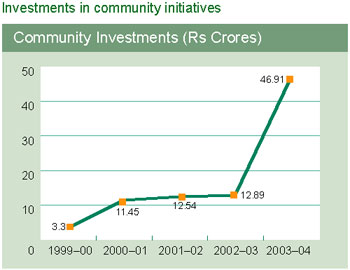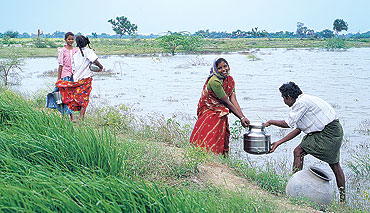 The present average soil loss in India is about 16.35 tonnes per
hectare per year, which is at least 3 to 5 times worse than what it ought to be. Nearly
67% of the cultivated area in the country faces severe moisture stress for 5 to 10 months
a year. Crop productivity in drylands is low, unstable and highly vulnerable to
seasonality.
ITC's Integrated Watershed Development initiative is a key
intervention to reverse this moisture stress in some of the more acutely affected,
drought-prone districts of the country. Currently, 541 small and large water harvesting
structures built by ITC provide critical irrigation to nearly 8,000 hectares of land in
Andhra Pradesh, Karnataka and Madhya Pradesh. This programme will soon be extended to
Uttar Pradesh and Bihar.
ITC's watershed development programme seeks to achieve two
critical objectives: water conservation and soil enrichment. It constitutes water user
groups and trains them to plan and build water harvesting structures like contour bunds,
check dams, percolation tanks and farm ponds.
Trained farmers use their knowledge of the terrain to
identify locations for building water structures and develop related micro plans. ITC
contributes 75% of the cost. The balance 25% is mobilised by the user groups. The rich
silt excavated from percolation tanks is used to enhance soil fertility. User groups raise
regular contributions from the farmers to meet the maintenance cost of these water
harvesting structures.
So far ITC has brought nearly 8,000 hectares of degraded
land under its soil and moisture conservation programme, providing critical irrigation and
generating employment during the lean season.
The rainwater harvesting potential created through these
structures, together with other water conservation efforts, have enabled ITC achieve the
status of being a water-positive Company for the second successive year.

|


